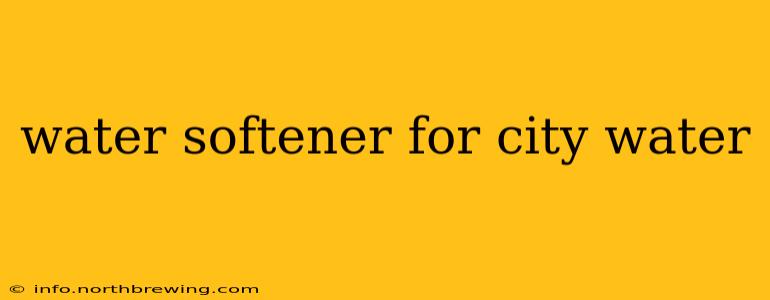Many homeowners assume that city water is automatically "soft" and doesn't require softening. This isn't always true. While city water undergoes treatment to remove contaminants, hardness minerals (calcium and magnesium) often remain. These minerals can cause a variety of issues, prompting many to consider a water softener, even with city water. This comprehensive guide explores the need for water softeners in homes supplied with city water, addressing common concerns and questions.
Is City Water Always Soft?
No, city water isn't always soft. The hardness level depends on the source of the water and the treatment processes used by your local water utility. Some cities have naturally soft water sources, while others draw water from sources high in minerals. Even with treatment, significant mineral content may persist. To determine your water's hardness, you can purchase a home water testing kit or contact your local water utility for a water quality report.
What are the Signs I Need a Water Softener, Even with City Water?
Several signs indicate that your city water may be too hard and a water softener is beneficial:
- Scale buildup: Notice white, chalky deposits on faucets, showerheads, appliances (dishwashers, washing machines), and plumbing fixtures? This is scale, a direct result of hard water minerals.
- Dry skin and hair: Hard water can strip natural oils from your skin and hair, leaving them feeling dry, itchy, and brittle.
- Soap scum: Soap doesn't lather easily, and you see a persistent film or residue in your bathtub or sink.
- Clogged pipes: Scale buildup can restrict water flow and eventually clog pipes, leading to costly plumbing repairs.
- Spotty dishes and laundry: Hard water can leave spots and streaks on your dishes and laundry, even after washing.
- Reduced appliance efficiency: Scale buildup on heating elements in appliances reduces their efficiency and shortens their lifespan.
What are the Different Types of Water Softeners?
Several types of water softeners are available, each with advantages and disadvantages:
- Ion-exchange water softeners: These are the most common type, using resin beads to exchange hard water minerals (calcium and magnesium) for sodium or potassium ions. They require salt for regeneration.
- Salt-free water softeners: These systems don't use salt but instead use a process of precipitation to remove hard water minerals. They are generally less effective than ion-exchange softeners.
- Magnetic water conditioners: These systems use magnets to claim to alter the structure of minerals, preventing them from bonding and forming scale. Their effectiveness is debated.
How Much Does a Water Softener for City Water Cost?
The cost of a water softener varies widely based on factors like size, features, and brand. Installation costs also need to be factored in. Expect to spend anywhere from a few hundred dollars to several thousand dollars for a complete system. Consider the long-term benefits, such as reduced appliance repair costs and improved water quality, when comparing costs.
Will a Water Softener Affect My City Water Bill?
A water softener itself doesn't directly increase your water bill. However, it can indirectly reduce your water consumption if you previously had to use more water due to poor lathering from hard water.
Is It Better to Have a Whole-House or Point-of-Use Water Softener?
The best choice depends on your needs and budget:
- Whole-house water softeners: Treat all the water entering your home, providing soft water to all faucets and appliances. They are generally more expensive but provide comprehensive softening.
- Point-of-use water softeners: Treat water at a single point of use, such as a shower or sink. They are less expensive but only soften water at the specific location.
How Often Do I Need to Maintain a Water Softener?
Maintenance requirements depend on the type of softener and water usage. Regularly check the salt levels in ion-exchange softeners and potentially need to clean or regenerate the system periodically. Consult your owner's manual for specific maintenance instructions.
This guide provides a comprehensive overview of water softeners for city water. Remember to test your water to determine its hardness level and consult with a water treatment professional to choose the best system for your home and budget. Investing in a water softener can significantly improve your water quality and protect your plumbing and appliances in the long run.
